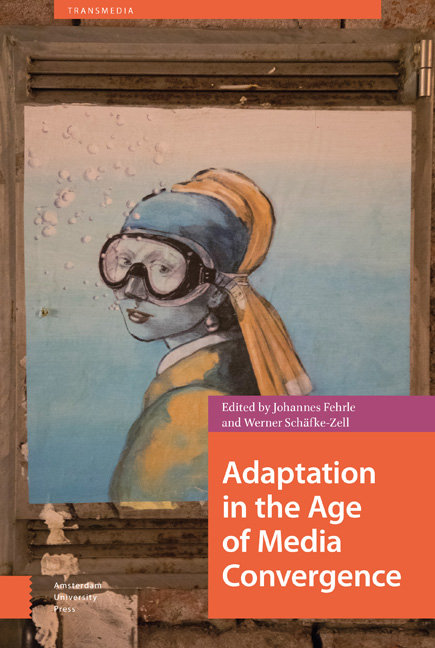Book contents
- Frontmatter
- Contents
- 1 Introduction: Adaptation in a Convergence Environment
- 2 Adaptation as Connection: A Network Theoretical Approach to Convergence, Participation, and Co-Production
- 3 Filing off the Serial Numbers: Fanfiction and its Adaptation to the Book Market
- 4 From Paratext to Polyprocess: The “Quirky” Mashup Novel
- 5 “You Just Got Covered”: YouTube Cover Song Videos as Examples of Para-Adaptation
- 6 Masters of the Universe? Viewers, the Media, and Sherlock's Lead Writers
- 7 Alien Adapted (Again and Again): Fictional Universes between Difference and Repetition
- 8 “Everything is Awesome:” Spreadability and The LEGO Movie
- 9 Localization as Adaptation in the Wolfenstein Franchise
- Index
7 - Alien Adapted (Again and Again): Fictional Universes between Difference and Repetition
Published online by Cambridge University Press: 21 November 2020
- Frontmatter
- Contents
- 1 Introduction: Adaptation in a Convergence Environment
- 2 Adaptation as Connection: A Network Theoretical Approach to Convergence, Participation, and Co-Production
- 3 Filing off the Serial Numbers: Fanfiction and its Adaptation to the Book Market
- 4 From Paratext to Polyprocess: The “Quirky” Mashup Novel
- 5 “You Just Got Covered”: YouTube Cover Song Videos as Examples of Para-Adaptation
- 6 Masters of the Universe? Viewers, the Media, and Sherlock's Lead Writers
- 7 Alien Adapted (Again and Again): Fictional Universes between Difference and Repetition
- 8 “Everything is Awesome:” Spreadability and The LEGO Movie
- 9 Localization as Adaptation in the Wolfenstein Franchise
- Index
Summary
Abstract
By adding storyworld upon storyworld, franchises create fictional universes. These are contested territory in terms of their constitution and the meaningfulness and ascendancy of their various elements. The very fact that fictional universes can be contested points to their defining characteristics: they are open, dynamic, flexible, and heterogeneous. This begs the question of semantic and pragmatic control over such universes in terms of production, access, permanence, and reception. Considering that franchises usually span a host of different media, they deserve a closer look in relation to adaptation, remaking, intermediality, and transmediality. This essay uses the f ictional universe of the Alien franchise as an example to make a fundamental argument about the dynamics of fictional universes and their storyworlds.
Key words: Fictional universes; franchises; adaptation; transmediality; remakes
Introduction
On June 1, 2012, one day after the premiere of the film Prometheus in London, the BBC conducted a radio interview with the film's director Ridley Scott. In the course of the interview, the radio host asked Scott whether the film, although clearly being “in the same constellation, the same galaxy,” was a direct prequel to Scott's 1979 film Alien, to which Scott replied “absolutely not.” The comment prompted a lively debate in numerous fanzines, magazines, and newspapers (e.g. The Guardian, New York Post, Scientific American, and Huffington Post). Whether or not one considers Prometheus a prequel to Alien wholly depends, of course, on one's definition of “prequel.” A general definition of a prequel, as a fiction chronologically situated prior to, but in the same fictional universe as, that of another (already released/published) text's storyworld would make Prometheus a prequel. A specified definition of prequel that additionally requires fairly close temporal proximity between the two narratives, a (logical or causal) connection of their plots, and the inclusion of some key characters at an earlier age/stage (say, the young Ellen Ripley or Bishop), would make Prometheus indeed part of “the same constellation, the same galaxy” as Alien, but not a prequel.
As inconsequential as it is, this little quibble illustrates a number of interesting points, authorial intention not being chief among them. For one, by adding textual storyworld upon storyworld, franchises inevitably create fictional universes.
- Type
- Chapter
- Information
- Adaptation in the Age of Media Convergence , pp. 159 - 174Publisher: Amsterdam University PressPrint publication year: 2019



